12.12. “Political mindreading as a rhetorical strategy” by Oona Ala-Koivula.
Join us as Research Centre Narrare’s interdisciplinary Narrative Studies Seminar continues on Tuesday 12.12. at 4:15 pm (EET) with “Political mindreading as a rhetorical strategy” by Oona Ala-Koivula.
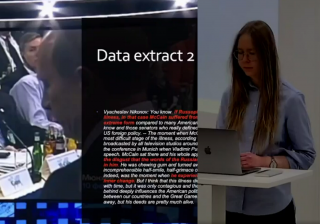
Room Pinni B4113 or Zoom (Link). (Meeting ID: 668 4700 7494 Passcode: 045076)
Attributing thoughts, desires, motives, emotions, and other inner experiences to other people is a highly routinized feature of our everyday sensemaking. However, even though people can imagine and believe to know what is going on in other peoples’ minds, there is no direct access to others’ consciousness, leaving room for multiple interpretations all based on an epistemic leap from the interior of one mind to another. The paper argues that the routinized folk-psychological way of making sense of the reality around us and the lack of actual access to others’ minds opens a site for political persuasion. To grasp this process, the paper introduces the idea of political mindreading as a means of persuasion in political interaction in which political actors make sense of political events by suggesting folk-psychological descriptions of how things are and why, and so doing the mindreading routine for their audiences. Furthermore, the paper suggests that the portrayal of others’ minds works as a form of epistemic governance, that is, as a means to influence people’s conceptions of social reality and actors in it (Alasuutari & Qadir 2014; 2019). In the empirical analysis this phenomenon is investigated through the case of a Russian political talk show, ‘Bolshaya igra’, analyzing extracts of political mindreading in the opening episode of the program centered on the recently passed US senator John McCain.
The Narrative Studies Seminar is open to all interested persons. The aim of the seminar is to allow for a multi- and interdisciplinary discussion on data, methods, theories, and the state of narrative research. Sessions consist of introductory presentations by researchers from different fields studying narratives at Tampere University (up to 20 min), and general discussion.
28.11. “Age of Uncertainty: Speculative Narratives in 21st-century Fiction and Nonfiction – Project Introduction” by Dr. Elise Kraatila
Join us as Research Centre Narrare’s interdisciplinary Narrative Studies Seminar continues on Tuesday 28.11. at 4:15 pm (EET) with “Age of Uncertainty: Speculative Narratives in 21st-century Fiction and Nonfiction – Project Introduction” by Dr. Elise Kraatila.
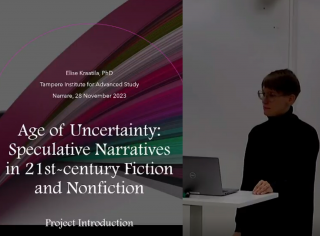
Room Pinni B4113 or Zoom (Link). (Meeting ID: 668 4700 7494 Passcode: 045076)
Fairly recently, it has become a critical commonplace across humanities and social sciences that we – as individuals, nations, and the humanity at large – are currently living under a pervasive atmosphere of uncertainty regarding the future. The Collins Dictionaries word of the year 2022, ‘permacrisis’, captures the resulting mood of our present media landscape, embodying “the dizzying sense of lurching from one unprecedented event to another, as we wonder bleakly what new horrors might be around the corner”. Following the Covid-19 pandemic, the ongoing war in Ukraine, and other major geopolitical crises, and amid increasing sense of precarity brought about by climate change, future is increasingly conceived of in media as a black box of unforeseeable but inevitable disasters, ranging from life-disrupting to existential.
In this atmosphere, speculative narratives proliferate across the media, from literary fictions and tv shows to science communication and journalism. Such narratives, characterized by scenario-building and “what if?” propositions, are used to consolidate, communicate and legitimize hypothetical knowledge in an effort to provide some contingently useful epistemic access to future developments and other fundamentally unknowable phenomena. My new research project at Narrare and Tampere IAS tackles the ways in which speculative narratives are constructed and utilized in response to the current atmosphere of uncertainty, and their potential to both contribute to it and seek to alleviate it. The project aims to conceptualize them as epistemic instruments, map their usage across contemporary media and analyze their constitution and impact. What is the epistemic potential of narrative to consolidate uncertain knowledge – and what are the limits, ethical implications and possible dangers of that potential?
The Narrative Studies Seminar is open to all interested persons. The aim of the seminar is to allow for a multi- and interdisciplinary discussion on data, methods, theories, and the state of narrative research. Sessions consist of introductory presentations by researchers from different fields studying narratives at Tampere University (up to 20 min), and general discussion.
21.11. “Considering political counter-narratives” by Matti Hyvärinen.
Join us as Research Centre Narrare’s interdisciplinary Narrative Studies Seminar contintues on Tuesday 21.11. at 4:15 pm (EET) with “Considering political counter-narratives” by Matti Hyvärinen, the vice director of Narrare.
Room Pinni B4113 or Zoom (Link). (Meeting ID: 668 4700 7494 Passcode: 045076)
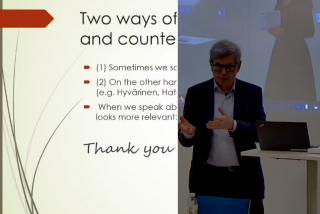
Counter-narrative is a term that abounds in recent narrative studies, whether in narratology, sociolinguistics, or narrative hermeneutics. Counter-narrative as a concept helps to thematize narrative contests (Phelan 2008) in general, the social life of narratives. In current research, at least three different perspectives to master & counter-narratives are present. In the first version, master narratives are thematized as culturally hegemonic, and counter-narratives as a method of marginal or subaltern groups. In this version, it is the scholar who decides which one is the master and which one the counter-narrative (“etic” approach). In the second version, counter-narrative is seen as an interactional and political strategy, which also defines the existing master-narratives. This approach emphasizes the role of speakers and tellers in defining and naming the master narratives and marking the ‘countering’ (“emic” approach). The third version, exhibited by James Dorson (2016), presents counter-narratives as a critique of narratives, which are understood as ideologies in terms of Hayden White.
The paper argues that purely emic approach is impossible since there is no valid idea about how speakers and tellers mark their stories as counter-narratives. It is suggested that there is continuum from individual and alternative narratives to explicit counter-narratives. By reading narratives told by Finnish ex-parliamentarians in their oral history interviews, it is argued that even politicians who have had powerful positions in the Government or the parliament, can tell obvious counter-narratives, supporting the hypothesis of the second version of counter-narrative studies.
The Narrative Studies Seminar is open to all interested persons. The aim of the seminar is to allow for a multi- and interdisciplinary discussion on data, methods, theories, and the state of narrative research. Sessions consist of introductory presentations by researchers from different fields studying narratives at Tampere University (up to 20 min), and general discussion.
14.11. “Telling habits: a scalar approach to embodied narratives” by Dr. Teresa Roversi
Join us as Research Centre Narrare’s interdisciplinary Narrative Studies Seminar contintues on Tuesday 14.11. at 4:15 pm (EET) with “Telling habits: a scalar approach to embodied narratives” by Dr. Teresa Roversi (Parma).
Room Pinni B4113 or Zoom (Link). (Meeting ID: 668 4700 7494 Passcode: 045076)
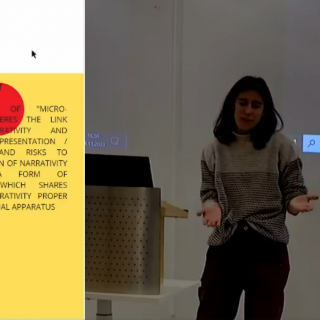
The relation between the concept of narrative and the bodily dimension of experience, personal identity, and action has always been controversial: Is there any deep structural analogy between narrative and action? Can narratives be said to develop out of bodily interaction with the environment? How can narrative decisions and self-reflections be translated into bodily and agentially efficacious attitudes? What is the relationship between narrative and minimal forms of selfhood? Is it possible to divest the concept of narrative from its discursive and/or representative elements without trivializing it into uselessness?
The talk will offer an overview of such issues and the broader philosophical problems they are nestled in, and propose a conceptual solution through a scalar approach. Softening the binary understanding of narrative allows to look for different degrees to which narratives can be found within the embodied subject and to identify an embodied narratable dimension. The Deweyan pragmatist notion of habits will be adopted as a way to understand to what extent can the body be narratively productive and narratively receptive, opening a space of transition between reflective and non-reflective dimensions of experience.
The Narrative Studies Seminar is open to all interested persons. The aim of the seminar is to allow for a multi- and interdisciplinary discussion on data, methods, theories, and the state of narrative research. Sessions consist of introductory presentations by researchers from different fields studying narratives at Tampere University (up to 20 min), and general discussion.
17.11. Interdisciplinary autumn seminar for PhD researchers
Group 1: Markku Lehtimäki (Room Linna K109)
Session I
13:15–14:45
Chair: Mari Hatavara
13:15–13:45 Charlotte Coutu: Representing the North and the Arctic: Discourse and Mediation of Arctic Hysteria (Comments: Reetta Eiranen)
13:45–14:15 Valentina Hoffrén: Female figures and women’s bodies in novels by Sofi Oksanen (Comments: Anna Ovaska)
14:15–14:45 Saara Kariranta: POLITICAL CONVERSATION THROUGH AESTHETIC – aesthetic, sensory-based intervention into the process of political decision-making (Comments: Aura Lounamaa)
14:45–15:15 Coffee break
Session II
15:15–16:45
Chair: Matti Hyvärinen
15:15–15:45 Riikka Pirinen: Literary Epiphany and the Modernist Minds of Short Fiction (Comments: Hanna-Riikka Roine)
15:45–16:15 Athmika Tarun: Hearing Voices in Graphic Autobiographies of Madness (Comments: Maria Mäkelä)
16:15 – 16:45 Yasaman Ghafaryanshirazi: Relations between Narratives and Emotional Intelligence in Development: An Integrative Review (Comments: Lieven Ameel)
Group 2: Dorien Van De Mieroop (Room Linna K110)
Session I
13:15–14:45
Chair: Matti Hyvärinen
13:15–13:45 Marja-Leena Räsänen-Ala-Aho: VOLUNTEER LEADERSHIP IDENTITIES – STORIES AND ACTIVITIES IN THE FOREST (Comments: Matti Hyvärinen)
13:45–14:15 Miriro Chizuwa: White writing and the Pastoral: Imagining of an alternative landscape through representations of children in Zimbabwean white writing. (Comments: Iida Pöllänen)
14:15–14:45 Aishwarya M: “See It Before It’s Gone”: Memory Retention in the Age of Ephemeral Digital Narratives (Comments: Tuomas Harviainen)
Session II
15:15–16:45
Chair: Mari Hatavara
15:15–15:45 Ville Hämäläinen: Controversial Voices (Comments: Sanna Turoma)
15:45–16:15 Oona Ala-Koivula: Political mindreading as a rhetorical strategy: discussing senator McCain’s mind on Russian state television (Comments: Elise Kraatila)
16:15 – 16:45 Phethile Zitha: Whose School is it anyway: A collaborative study on the narratives of schooling in a post-apartheid township high school. (Comments: Hanna Rautajoki)
17.11. Open Keynotes: Professor Dorien Van De Mieroop & Professor Markku Lehtimäki
Keynote speeches for Narrare’s 6th annual Interdisciplinary Autumn Seminar for PhD Researchers. Keynotes are open to all interested persons.
Time: Friday 17 November, 10:00–12:00
Place: Väinö Linna -Auditorium, Linna -building (Kalevantie 5)
10.00 Markku Lehtimäki: Narrative Design and Rhetorical Reading
11.00 Dorien Van De Mieroop: Talking about the past, but in the present: The intricate relation between stories and their context
The event will be streamed. (Zoom link Meeting ID: 674 6870 2086 Passcode: 879069)
Speaker Bios and Abstracts
Dorien Van De Mieroop: Talking about the past, but in the present: The intricate relation between stories and their context
When telling stories, narrators not only set up a storyworld context, but they also relate their stories to the storytelling context. Especially when the time lapse between both contexts – the story’s events and the act of telling the story – is rather large, this may result in a re-framing of the stories by the narrators, as I will illustrate in this presentation. Using a discourse analytical approach, I present analyses from a corpus of various types of narratives occurring in interviews, e.g with former colonials from the Belgian Congo, with former slaves in the US and with former prisoners of World War II concentration camps. I then scrutinize how these interviewees construct their stories about a storyworld in the past in relation to the societal demands and expectations of the storytelling present. As such, I aim to uncover the close relation between narratives and their contexts.
Dorien Van De Mieroop is a Professor of Linguistics at KU Leuven, Belgium. Her main research interests lie in the discursive analysis of identity in institutional interactions and narratives, about which she published more than 50 articles in international peer-reviewed journals and co-authored or co-edited a few books and special issues (e.g. ‘The language of leadership narratives’ (2020, with Jonathan Clifton and Stephanie Schnurr), ‘Identity struggles’ (2017, with Stephanie Schnurr), and ‘Master narratives, identities, and the stories of former slaves’ (2016, with Jonathan Clifton)). She is co-editor of the journal Narrative Inquiry.
See: https://www.arts.kuleuven.be/midi/members/dorienvandemieroop for more information.
Markku Lehtimäki: Narrative Design and Rhetorical Reading
In his introduction to postclassical narratology at the end of 1990s, David Herman – referring to natural metaphors – envisioned that the “landscape” of narratological inquiry now displays a different “topography” than the one “mapped” by structuralism, and, as he suggested, this reconfiguration and transformation can be described as a “shift from text-centered or formal models to modes that are jointly formal and functional.” Richard Walsh, one of the foremost advocates of a pragmatic view of fiction, nicely captures the futility inhering in the structuralist conception of fiction and reading when he writes that “readers cannot be content merely to construct fictional worlds, as if this in itself were endlessly satisfying; they must also be concerned to evaluate them, to bring them into relation with the larger context or their own experience and understanding.” What is needed in our age of the Anthropocene, however, is to think of “fictional worlds” – the traditional object of narratological studies – in relation to the natural environment outside textual boundaries. There is already a fruitful tradition in combining ecocriticism and narratology in twenty-first-century narrative theory, focusing on both environmental issues and narrative structures, and I will refer to these developments in my presentation.
In my presentation, I will especially focus on the ways in which a narrative’s textual designs try to capture the sense of changing ecologies and how the narrative’s rhetoric aims to persuade the reader of things in the world. I will tentatively ask how a focus on the novelists’ exploration of ecological issues can be complemented with a closer look at narrative designs by means of which they engage with those issues. In other words, the “how” and the “what” aspects of the narrative text – its form and content or its design and purposes – should be recognized as equally important dimensions. I believe that by providing new tools for analyzing textual designs, narrative theory can enrich the methods of ecocritical analysis; in other words, a focus on narrative forms may reveal new modes of interconnection between textual practices and natural ecologies. Conversely, ecocritics can provide narrative theorists with new questions to address when it comes to the study of narrative forms: for example, how might an author’s concern with a particular kind of ecology motivate the use of specific forms?
Apparently, my approach is not attached to the old-fashioned search for solid authorial meanings but recognizes the reader’s active work in finding the narrative’s design. Design can be conceptualized as a plot, structure, or form of the narrative, and novels can be shaped according to visual or spatial models. Peter Brooks, in his psychoanalytically informed study of “design and intention” in narrative, mainly concentrates on plot as that which gives shape and meaning to literary texts and makes us read forward. Yet Brooks’s focus on the formal aspects of plots and the desire of reading for the most part leaves out the discussion about the thematic meaning of narratives. I still see much value in the contested concept of the implied author as someone who or something which designs the text in a certain way and for some specific rhetorical purposes. As James Phelan argues in his book Experiencing Fiction, “texts are designed by authors in order to affect readers in particular ways.” Accordingly, I aim to delineate those rhetorical devices and aesthetic designs, which have particular effects on their readers – “readers” here understood not only as real and embodied but also as hypothetical constructions created by specific narratives.
Therefore, I want to think of literary narratives as “rhetorical designs,” which present their storyworlds and thematic ideas to their readers through elaborate narrative and aesthetic means. Referring to my case studies (Ian McEwan’s Solar [2010], Jenny Offill’s Weather [2020]), I argue that novels may be designed to shape readers’ reimagination of climate change and related environmental issues. A novel’s environmental rhetoric need not take a volubly didactic or educational form, however; rather, its rhetorical design always also includes an ethical content as it tries to open the reader’s eyes to the things in the world. In other words, fictional narratives can be thought of as forms of rhetoric, communicating ideas and values concerning the real world. A truly rhetorical reading of narrative designs is always also a “reflexive” reading, alert to the ways in which changing ecologies and their mediations challenge the conventions of narrative fiction.
Markku Lehtimäki, Ph.D., is Professor of Comparative Literature at the University of Turku, Finland. His fields of expertise are narrative theory, visual culture, ecocriticism, and American literature. His research projects include The Changing Environment of the North: Cultural Representations and Uses of Water (2017–2021), funded by the Academy of Finland, and The Novel’s Knowledge: Changing Roles of Author and Book in Society (2022–2024), funded by the Kone Foundation. He is the author of The Poetics of Norman Mailer’s Nonfiction: Self-Reflexivity, Literary Form, and the Rhetoric of Narrative (2005) and Sofi Oksasen romaanitaide: Kertomus, etiikka, retoriikka (“The Art of Sofi Oksanen’s Novels: Narrative, Ethics, Rhetoric”, 2022) and co-editor of several books, most recently Visual Representations of the Arctic: Imagining Shimmering Worlds in Culture, Literature and Politics (2021) and Cold Waters: Tangible and Symbolic Seascapes of the North (2022).
7.11. “Kotimainen spekulatiivinen fiktio ja demokratian kertomus juuri nyt.” Esko Suoranta
Tutkimuskeskus Narraren monitieteellinen kertomuksentutkimuksen seminaari jatkuu tiistaina 7.11. klo. 16:15. Vuorossa on Esko Suorannan alustus ”Kotimainen spekulatiivinen fiktio ja demokratian kertomus juuri nyt”
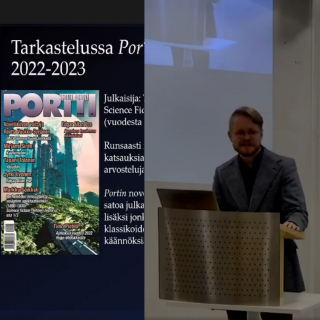
Tila: Pinni B4113 tai Zoom (Link). (Meeting ID: 668 4700 7494 Passcode: 045076)
Spekulatiivista fiktiota lajityyppinä määrittää toisenlaisten asiaintilojen kuvittelu ja etualaistaminen. Sitä pidetään milloin tulevaisuusorientoituneen, yhteiskunnallisen kuvittelun veturina, milloin konservatiivisena näpertelynä vailla potentiaalia vaikuttaa. Osana Koneen säätiön rahoittamaa tutkimushanketta Kuvittele, demokratia! Kertomakirjallisuus demokratian kuvittelun välineenä Suomessa tutkitaan spekulatiivista fiktiota taiteen kenttänä, jossa demokratian kehitystä, nykytilaa, varjopuolia ja uhkia potentiaalisesti käsitellään. Seuraten Isobel Armstrongia (2016) on kuitenkin tärkeää huomata, että demokraattisen mielikuvituksen analysointia ei tule rajata vain eksplisiittisesti yhteiskunnalliseen fiktioon. Esitelmässään Narrare-tutkimusseminaarissa hankkeen tutkija FT Esko Suoranta luokin katsauksen laajaan kirjoon tuoretta SF-lyhytproosaa. Vuosina 2022-2023 Portti ja Tähtivaeltaja-lehdissä ilmestyneiden novellien kautta aukeaa kuva demokratian kuvittelusta kotimaisessa spefissä juuri nyt — osansa saavat niin satiiriset tulevaisuusdystopiat kuin uuskumman kautta valotetut nykymuotoisen demokraattisen hyvinvointivaltiomme kipupisteet.
Kertomuksentutkimuksen seminaari on kaikille avoin, ja sen tavoitteena on herätellä moni- ja poikkitieteistä keskustelua aineistoista, menetelmistä, teorioista ja tutkimuksen tilasta. Seminaarissa keskustellaan meneillään ja aluillaan olevista kertomukseen liittyvistä tutkimuksista. Jokainen kerta sisältää alustuksen (noin 20 min) sekä keskusteluosuuden. Esitelmöijät ovat eri uravaiheissa olevia Tampereen yliopiston tutkijoita.
31.10. “Vertailussa kaksi erilaista tapaa täydentää tarinaa” Tiina Määttä
Tutkimuskeskus Narraren monitieteellinen kertomuksentutkimuksen seminaari jatkuu tiistaina 31.10. klo. 16:15. Vuorossa on Tiina Määtän alustus ”Vertailussa kaksi erilaista tapaa täydentää tarinaa”
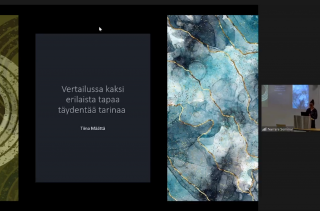
Tila: Pinni B4113 tai Zoom (Link). (Meeting ID: 668 4700 7494 Passcode: 045076)
Tarinanantäydennysmetodia käytetään sellaisten aihepiirien tutkimiseen, jotka sisältävät moraalisia jännitteitä (esim. Clarke, Braun & Wooles 2015). Metodissa osallistujat täydentävät tutkijan johdantolauseella aloittamaa tarinaa ja siten eriyttävät itsensä sisällöstä kuvitellun tarinan päähenkilön kautta. Metodia käytetään erityisesti silloin, kun tutkija on kiinnostunut osallistujien motiiveista ja arvoista. Esityksessä vertaillaan kahta erilaista tapaa toteuttaa tarinantäydennysmetodia, kun tutkimuksen kohteena on 15–17-vuotiaiden ymmärrys solidaarisuudesta. Ensimmäinen aineisto kerättiin siten, että nuoret täydensivät pienryhmissä yhteistä tarinaa fiktiivisestä joukkokokoontumisesta. Toinen aineisto koostuu nuorten yksilöllisesti kirjoittamista tarinoista, joissa kuvitteellinen päähenkilö rakentaa uuden yhteiskunnan maailmanlopun jälkeen. Tässä esityksessä vertaillaan sitä, kuinka nämä kaksi erilaista tapaa täydentää tarinaa vaikuttavat tarinoiden päähenkilöiden toimijuuteen, kerronnan etenemiseen sekä tarinoissa oleviin ajallisiin ja (mielen)tilallisin kerrostumiin.
Kertomuksentutkimuksen seminaari on kaikille avoin, ja sen tavoitteena on herätellä moni- ja poikkitieteistä keskustelua aineistoista, menetelmistä, teorioista ja tutkimuksen tilasta. Seminaarissa keskustellaan meneillään ja aluillaan olevista kertomukseen liittyvistä tutkimuksista. Jokainen kerta sisältää alustuksen (noin 20 min) sekä keskusteluosuuden. Esitelmöijät ovat eri uravaiheissa olevia Tampereen yliopiston tutkijoita.
10.10. ”How To Change God’s Mind: Re-envisioning Theory with Julian of Norwich” by Godelinde Perk, PhD
Join us as Research Centre Narrare’s interdisciplinary Narrative Studies Seminar contintues on Tuesday 10.10. at 4:15 pm (EEST) with ”How To Change God’s Mind: Re-envisioning Theory with Julian of Norwich” by Godelinde Perk, PhD
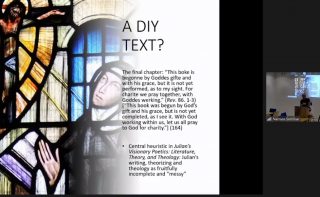
Room Pinni B4113 or Zoom (Link). (Meeting ID: 668 4700 7494 Passcode: 045076)
The earliest known English woman writer, Julian of Norwich (c. 1343–c.1416), wrote two versions of a numinous, subtle visionary text, A Revelation of Love, an earlier, shorter incarnation and a later, longer one. Both evince persistent rethinking, with the longer text explicitly concluding that it is not yet finished. Drawing on a chapter from my monograph in process (Julian’s Visionary Poetics: Literature, Theory, and Theology), this presentation charts how these texts consistently thematize their composition, analysis, and reception. In a fashion, Revelation concerns itself with a project analogous to that of modern theory. Julian will reveal herself to be a “messy” theorist, who consistently rethinks her theory. By constantly retheorizing writing, analysis, and readers’ engagement (as shown by her constant unmooring and resecuring of her theoretical frameworks), she remakes human minds’ access to God’s secrets, “privetes” or “prive consayles” (“secret councils”), and in particular the boundaries around this secret knowledge that map onto the boundaries around auctoritee (“authoritativeness”). A vernacular theorist in addition to a messy one, she also rewrites the significance of vernacular writers in this project of unveiling God’s hitherto unrevealed knowledge, redrawing the limits of what is considered approved knowledge. To uncover how Julian can interrogate both medieval and modern theory, I pair Revelation with texts likewise thematising and theorizing their own form and reception (The Cloud of Unknowing, The Canterbury Tales, and continental discussions by for instance Low Countries authors from the Devotio Moderna); Julian will also act a powerful interlocutor of ecocriticism (Donna Harraway’s work in particular) as well as of affect theory (represented by Rita Felski). In this manner, A Revelation of Love can “incomplete” modern theory in a Dinshawesque “queer touch across time” and open up unforeseen critical avenues.
The Narrative Studies Seminar is open to all interested persons. The aim of the seminar is to allow for a multi- and interdisciplinary discussion on data, methods, theories, and the state of narrative research. Sessions consist of introductory presentations by researchers from different fields studying narratives at Tampere University (up to 20 min), and general discussion.
19.9. ”Political poetics in rhetorical use: Flattening and twisting double-temporality for persuasive purposes” by Hanna Rautajoki
Join us as Research Centre Narrare’s interdisciplinary Narrative Studies Seminar kicks off again next week on Tuesday 19.9. at 4:15 pm (EEST) with ”Political poetics in rhetorical use: Flattening and twisting double-temporality for persuasive purposes” by Hanna Rautajoki.
Room Pinni B4113 or Zoom (Link). (Meeting ID: 668 4700 7494 Passcode: 045076)
The presentation investigates discursive strategies employed in Donald Trump’s public speech prior to Jan 6th invasion in the Congress House in 2021. In particular, I am interested in the narrative organization of identifications and evaluative positionings through moral casting of the scene. I also pay attention to the projective use of positionings. The time of the told and the time of the telling reverse and infuse in the speech to manage the ongoing time frame and mobilize support and physical activities among the audience. I combine analytic tools from membership categorization analysis, narrative positioning and epistemic governance.
The Narrative Studies Seminar is open to all interested persons. The aim of the seminar is to allow for a multi- and interdisciplinary discussion on data, methods, theories, and the state of narrative research. Sessions consist of introductory presentations by researchers from different fields studying narratives at Tampere University (up to 20 min), and general discussion.
Join us this fall as Research Centre Narrare’s interdisciplinary Narrative Studies Seminar continues.
The Narrative Studies Seminar brings together researchers from different fields studying narratives at Tampere University. The aim of the seminar is to allow for a multi- and interdisciplinary discussion on data, methods, theories, and the state of narrative research. Individual sessions consist of an introductory presentation (up to 30 min) and general discussion.
The seminar is a hybrid event: participants can join on site, or online via Zoom (Link). (Meeting ID: 668 4700 7494 Passcode: 045076)
19.9.-12.12.2023 Narrative Studies Seminar Programme (Fall 2023)
Programme:
Time: selected Tuesdays at 4:15–5:00 pm.
Location: Room Pinni B 4113 (Kanslerinrinne 1)
19.9. Hanna Rautajoki Political poetics in rhetorical use: Flattening and twisting double-temporality for persuasive purposes
10.10. Godelinde Perk How To Change God’s Mind: Reenvisioning Theory With Julian of Norwich
31.10. Tiina Määttä Vertailussa kaksi erilaista tapaa täydentää tarinaa
7.11. Esko Suoranta Kotimainen spekulatiivinen fiktio ja demokratian kertomus juuri nyt
14.11. Teresa Roversi Telling habits: a scalar approach to embodied narratives
21.11. Matti Hyvärinen Understanding political counter-narratives
28.11. Elise Kraatila Age of Uncertainty: Speculative Narratives in 21st-century Fiction and Nonfiction (project introduction)
12.12. Oona Ala-Koivula Political mindreading as a rhetorical strategy
CFP: Narrare interdisciplinary autumn seminar for PhD researchers November 17, 2023, Tampere University
Deadline for proposals September 15,
Deadline for final seminar papers November 3.
If your PhD project involves studying narrative or if you make use of narrative methods, this announcement is for you. On Friday November 17, 2023, Narrare: Centre for Interdisciplinary Narrative Studies hosts its seventh annual seminar for PhD students. The seminar provides a chance to meet PhD researchers from diverse backgrounds who work on or with narrative, but also to participate in Narrare’s ongoing endeavor of developing theories, methods, and analytical tools for the field of interdisciplinary narrative studies.
The seminar papers will be commented on by the senior researchers and professors of the Centre. Our confirmed visiting scholars commenting on the workshop papers this year are Professor Dorien Van De Mieroop and Professor Markku Lehtimäki.
Proposals: We ask prospective participants to submit a proposal for a paper to be presented at the seminar. The one-page proposal should include: title, research question, target material, method and theoretical framework plus a short description of the issues the author would like the seminar to address when discussing their paper. The language of the proposals and the seminar is English.
Seminar papers & presentations: Those selected to present at the seminar are expected to send in written papers to be discussed. Papers should include an extended version (2 to 3 pages) of the proposal and a representative excerpt (2 to 3 pages) of their target material. In case the original target material is in any other language than English, we ask for you to provide a short sample (for example half-a-page) of the material translated to English. On the day of the seminar, participants are expected to present their papers briefly (max. 5 minutes) before comments and discussion.
The seminar will be held on site at Tampere University. If there is room in the program, a hybrid panel with some of the PhD participants online can be organized. Please indicate clearly in your application if you can only participate online.
Please apply by sending your proposal to Markus Laukkanen (markus.laukkanen@tuni.fi) by September 15. The deadline for the final seminar papers is November 3.
Visiting scholars:
Dorien Van De Mieroop is a Professor of Linguistics at KU Leuven, Belgium. Her main research interests lie in the discursive analysis of identity in institutional interactions and narratives, about which she published more than 50 articles in international peer-reviewed journals and co-authored or co-edited a few books and special issues (e.g. ‘The language of leadership narratives’ (2020, with Jonathan Clifton and Stephanie Schnurr), ‘Identity struggles’ (2017, with Stephanie Schnurr), and ‘Master narratives, identities, and the stories of former slaves’ (2016, with Jonathan Clifton)). She is co-editor of the journal Narrative Inquiry.
See: https://www.arts.kuleuven.be/midi/members/dorienvandemieroop for more information.
Markku Lehtimäki, Ph.D., is Professor of Comparative Literature at the University of Turku, Finland. His fields of expertise are narrative theory, visual culture, ecocriticism, and American literature. His research projects include The Changing Environment of the North: Cultural Representations and Uses of Water (2017–2021), funded by the Academy of Finland, and The Novel’s Knowledge: Changing Roles of Author and Book in Society (2022–2024), funded by the Kone Foundation. His is the author of The Poetics of Norman Mailer’s Nonfiction: Self-Reflexivity, Literary Form, and the Rhetoric of Narrative (2005) and Sofi Oksasen romaanitaide: Kertomus, etiikka, retoriikka (“The Art of Sofi Oksanen’s Novels: Narrative, Ethics, Rhetoric”, 2022) and co-editor of several books, most recently Visual Representations of the Arctic: Imagining Shimmering Worlds in Culture, Literature and Politics (2021) and Cold Waters: Tangible and Symbolic Seascapes of theNorth (2022).
For further information contact: markus.laukkanen@tuni.fi
Please feel free to circulate this message.
Spring 2023: Narrative Studies Seminar
Narrative Studies Seminar
Spring 2023
Join us this spring as Research Centre Narrare’s interdisciplinary Narrative Studies Seminar continues.
The Narrative Studies Seminar brings together researchers from different fields studying narratives at Tampere University. The aim of the seminar is to allow for a multi- and interdisciplinary discussion on data, methods, theories, and the state of narrative research. Individual sessions consist of an introductory presentation (up to 30 min) and general discussion.
The seminar is a hybrid event: participants can join on site, or online via Zoom (Link). (Meeting ID: 668 4700 7494 Passcode: 045076)
Programme:
Time: selected Tuesdays at 4:00–5:00 pm.
Location: Tampere University in room Pinni B3111. (Note: Room changed from 7.3. onwards)
24.1. Mari Haravara ”Computational recognition of narratives”
14.2. Marko Teräs ”Official Document Utopias”
7.3. Markus Laukkanen “The Implied Fandom and Game of Thrones”
28.3. Elise Kraatila “Speculative Pasts and Futures in Non-Fictional Narratives” (Note: date changed from 21st to 28th)
18.4. Riikka Pirinen “Literary Epiphany from Modernism to Contemporary Short Story: Experience, Consciousness Presentation, and the Modernistic Tendecy”
25.4. Maria Mäkelä “The Campfires of Storytelling Consultancy”
16.5. Anna Ovaska “Toward Engaged Narratology?”
5.–6.7. Education for the Planet: Building Universal Climate Literacy with Children’s Literature and Media

Tampere University, Main building (Kalevantie 4) room A06
July 5–6, 2023
Education for the Planet:
Building Universal Climate Literacy with Children’s Literature and Media
Professional development workshop organized by Narrare: Centre for Interdisciplinary Narrative Studies in partnership with the Center for Climate Literacy at the University of Minnesota-Twin Cities, USA
The climate emergency presents us with an existential challenge, in which business-as-usual ways of living our lives and doing our work amount to complicity with the destruction of our planetary home. How do we take a stand? How do we make a difference, especially in our professional capacities? This two-day workshop will address these questions for teachers, academics, and other educators who work with young people. Led by Marek Oziewicz, Director of the Center for Climate Literacy at the University of Minnesota-Twin Cities, the workshop will help you understand why climate change and the Anthropocene are primarily challenges to our story systems. You will watch two films, read a couple of picturebooks, explore Finnish ecofiction, and participate in discussions about how stories model climate literacy practices and lifestyles. You will learn about climate literacy as a broader competence that includes the knowledge of facts and numbers but centers on developing attitudes, values, and behavioral change aligned with how we should live to respect our planetary home. You will learn about the work of the Center for Climate Literacy and about opportunities to use its resources in your teaching and research.
The workshop is open to anyone interested in sharing transformational children’s stories with their families and friends, but it will be of special value to teachers and educators. It will help you appreciate why literature, film, and other narrative media for young audiences are the best technology for social transformation and why sharing insights about these stories is the best strategy for accelerating a transition to an ecological civilization.
Note that the time has changed: This workshop will be offered in an in-person format, between 9:00 and 12:00. It will consist of two 3-hour sessions on July 5-6.
Number of participants: 20-25
Register through this form (click here)
15.–17.6. Narrative Matters 2023 -conference
Instrumental Narratives: Narrative Studies and the Storytelling Boom
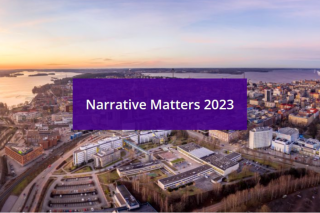
The conference positions narrative scholars in the midst of the storytelling boom. Everyone is urged to share their story today, from consumers to multinational corporations, from private citizens to nation states. Storytelling consultants are thriving in today’s storytelling economy, but where are narrative scholars? Do the professional analyzers and theorizers of narrative have a say in the current storytelling boom? How to engage in a societal dialogue and debate as a narrative scholar?
Featured topics:
storytelling boom and its social relevance
novel ways of storytelling today
emergent methods, ideas, and issues in narrative studies
More details on Narrative Matters 2023 website
23.5. MITÄ JOS? – MONITIETEINEN SPEKULAATIOTYÖPAJA
Tiistai 23.5. klo 10.15–15.30
Pinni B:n Olkkari (1029–30)
Erilaisten ”mitä jos?” -skenaarioiden rakentaminen, mahdollisten tulevaisuuksien ennakoiminen ja vaihtoehtoisten todellisuuksien kuvittelu – sanalla sanoen spekulaatio – kuuluu paitsi fiktion, myös tieteen ja tiedeviestinnän tiedolliseen ja kerronnalliseen keinovalikoimaan. Tänä päivänä elämme monin tavoin epävarmassa maailmassa, ja vaikka epävarmuus on pelottavaa, se toimii myös hedelmällisenä kasvualustana uudenlaisille, ristiriitaisille ja kilpailevillekin kuvitelmille. Erilaiset vaihtoehdot ovat jatkuvasti ilmassa, ja niihin kätkeytyy sekä uhkia että mahdollisuuksia niin yksilöiden kuin yhteiskuntienkin näkökulmasta.
Mutta mistä oikeastaan puhumme, kun puhumme spekulaatiosta, ja mitä käytännössä teemme, kun spekuloimme? Millaista tiedonintressiä spekulaatio palvelee, ja miten se suhteutuu kuvittelun, ennakoinnin ja hypoteesin kaltaisiin lähikäsitteisiin? Mikä on spekulaation suhde yhtäältä fiktioon, toisaalta yhteiskunnalliseen tulevaisuuden suunnitteluun? Miten kertomus ja keskustelu mahdollistavat spekulaatiota, ja missä kulkevat niiden rajat?
Tutkimuskeskus Narraressa 23.5.2023 klo 10.15–15.30 järjestettävässä monitieteisessä työpajassa spekulaation käsitettä ja käytänteitä lähestytään paitsi teoreettisesta näkökulmasta, myös vuorovaikutteisilla spekulaatioharjoitteilla. Paikkana on Pinni B:n Olkkari (1029–30). Työpajan tavoitteena on tuoda yhteen eri alojen tutkijoita rakentamaan yhdessä syvempää ymmärrystä siitä, mitä spekulaatio voi olla sekä luoda vapaa leikillinen tila spekulaation yhteiseen harjoittamiseen. Päivän lopuksi spekuloimme, mitä muuta annettavaa spekulaatiolla voisi olla kotimaiselle tutkimuskentälle: kiinnostaisiko spekulaatiosymposiumi, poikkitieteellisen yhteisjulkaisun ideointi tai jopa spekulaatiotutkimuksen verkoston perustaminen?
Työpajapäivä alkaa lyhyillä teoreettisilla alustuksilla, jotka johdattelevat pohtimaan, mitä spekulaatio merkitsee eri tieteenaloilla ja miten sitä voisi lähestyä monitieteisen kertomuksentutkimuksen näkökulmasta. Tämän jälkeen otamme konkreettisempaa tuntumaa spekulaatioon kognitiivisena, tiedollisena ja sosiaalisena toimintana tekemällä vaihtoehtoisia tapahtumakulkuja hahmottelevan kuvitteluharjoituksen. Työpajan ohjelman päättää eläytyvä keskusteluharjoitus, jossa ratkotaan yhteiskunnallisia ongelmia arkitodellisuudesta etäännytetyssä skenaariossa. Lopuksi, klo 15.30 eteenpäin, aikaa jää vapaalle keskustelulle ja virvokkeille.
Työpajaan ovat tervetulleita kaikki spekulaatiota tutkivat ja siitä kiinnostuneet tieteenalaan katsomatta. Paja on kuitenkin kokonaan suomenkielinen. Tarjoilujen mitoittamista varten pyydämme ilmoittautumaan mukaan 12.5. mennessä tällä lomakkeella: https://forms.office.com/e/iu32UftgFw.
Työpajan järjestävät spekulaatiota ja sen eri muotoja omissa hankkeissaan tutkivat tohtorit Hanna-Riikka Roine (Tampereen yliopisto), Elise Kraatila (Tampereen yliopisto) ja Essi Varis (Helsingin & Oslon yliopistot). Viime vuonna pajan järjestäjät tuottivat myös spekulaatioon keskittyvän teemaosion Fafnir – Nordic Journal for Science Fiction and Fantasy Research -lehteen: http://journal.finfar.org/fafnir-2-2022.
Lisätietoja: hanna.roine(at)tuni.fi, elise.kraatila(at)tuni.fi ja essi.varis(at)helsinki.fi.
16.5. “Toward Engaged Narratology?” by Anna Ovaska
Join us as Research Centre Narrare’s interdisciplinary Narrative Studies Seminar continues on Tuesday 16.5. at 4:00 pm with ”Toward Engaged Narratology?”.
Presenter: Anna Ovaska.
Room Pinni B3111, or Zoom (Link). (Meeting ID: 668 4700 7494 Passcode: 045076)
Stories can change the world, but how about narrative theory? Could narrative research be a form of activism?
In recent years, strands of contemporary narrative theory like intersectional, feminist and queer narratology (Warhol & Lanser 2015; Lanser 2018), econarratology (James & Morel 2020) and story-critical narratology (Mäkelä et al. 2021) have moved narrative research toward a politically, socially and environmentally conscious field of study that could be characterized as “engaged narratology”. Creating and disseminating understanding about narrative structures and forms, these theories emphasize that narrative strategies are not universal or neutral, but they carry out political forms and structures of power. Moreover, they offer new combinations of theory and activism, pedagogical interventions, and models for community engagement.
My talk reflects on the possibilities of “engaged narratology”: how it relates to other recent examples of engaged research (e.g., critical medical humanities, engaged phenomenology), what kinds of practices of outreach have been developed so far (e.g., Narrative for Social Justice -podcast) and what might lie ahead (crip narratology, neurodivergent narratology?).
12.5. Guest lecture: Monika Fludernik “The History of Free Indirect Discourse before Jane Austen”
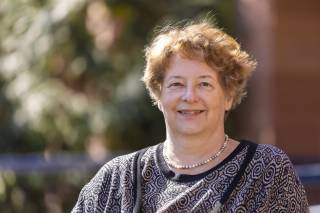
12 May at 10-12
Tampere University, city centre campus, Päätalo -building, Auditorium D10b.
Professor Monika Fludernik, Univesity of Freiburg
Free indirect discourse (FID) has often been claimed to occur from Jane Austen’s work onwards. Although there have been studies showing earlier instances, they have often been ignored. This lecture will present an up-to-date summary of FID occurrences since Middle English until Jane Austen, discussing the various forms and functions of the device and its uses in speech and consciousness representation. It will be shown that speech representations predominate before Austen but that FID was present in the eighteenth century to much larger extent than usually admitted, and that there are quite respectable instances in late medieval and early modern narrative as well.
Monika Fludernik is Professor of English Literature at the University of Frei-burg/Germany. Until 2021 she was also the director of the graduate school Factual and Fictional Narration (GRK 1767). Her major research interests include narratology, linguistic approaches to literature, especially metaphor studies, ‘Law and Literature,’ postcolonial studies and eighteenth-century aesthetics. She is the author of The Fictions of Language and the Languages of Fiction (1993), the award-winning Towards a ‘Natural’ Narratology (1996), Echoes and Mirrorings: Gabriel Josipovici’s Creative Oeuvre (2000), An Introduction to Narratology (2009) and Metaphors of Confinement: The Prison in Fact, Fiction and Fantasy (2019). Among her several (co-)edited volumes are Hybridity and Postcolonialism (1998), In the Grip of the Law (2004), Beyond Cognitive Metaphor Theory (2011), Idleness, Indolence and Leisure in English Literature (2014), Narrative Factuality: A Handbook (2019) and Being Untruthful: Lying, Fiction, and the Non-Factual (2021). Articles have appeared in, among others, Text, Semiotica, The Journal of Historical Pragmatics, English Literary History, New Literary History, Textual Practice, ARIEL, The Cambridge Journal of Postcolonial Literary Inquiry, Diacritics, Poetics Today, Narrative, Style, The Canadian Review of Comparative Literature and The James Joyce Quarterly.
Join on site or remotely via Zoom Link (Meeting ID: 692 9687 8567 Passcode: 047996)
All interested most welcome!
Note: Professor Fludernik will also act as a guest speaker at Narrare’s Concept Workshop “Voice” which takes place on the same day as the lecture at 13-16. More information and pre-registration: Link.
12.5. Concept Workshop: Voice
‘Voice’ has been a crucial and complex concept in various fields of humanities as well as social and political research. The workshop considers questions like voice as a metaphor and source of subjectivity vs. voice as socially, culturally, and politically layered phenomenon, voice as a metaphor vs. the use of the material voice. In qualitative social research, the “own voice” of the studied ordinary people was celebrated for a long time, and sometimes researchers even promised to “give a voice” to the marginalized or subaltern people. In many languages, such and German and Finnish, voice and vote are still expressed by the same word. In narratology, the voice (originally, by Genette) referred to the instance who was uttering the words and sentences we can read in different parts of fictional works. Feminist, postcolonial, and rhetorical narratologies, among others, have brought new layers and questions to the issue of the voice. How useful and productive is the concept of ‘voice’ for contemporary narrative studies? What different approaches to voice can be identified?
Guest speaker:
Monika Fludernik: Voice and the Medieval Storyteller
Other speakers:
Maria Mäkelä (literature): Voice and consciousness
Hanna Rautajoki (sociology): Aspects of voice in conversational storytelling
Mari Hatavara (literature): Vicarious voices
The workshop is open, but pre-registration on or before 4 May is recommended. Register here (https://forms.office.com/e/iftPaTJUav)
Note: Professor Fludernik will also present an open lecture on the same day at 10-12. More details: Link.
26.4. Book Launch: “Narrative in Urban Planning: A Practical Field Guide”
Lieven Ameel, Jens Martin Gurr, Barbara Buchenau
Book Launch for Narrative in Urban Planning: A Practical Field Guide
April 26, 2023. 15h-16.30h, at RJ108, School of Architecture, Hervanta Campus, Tampere University
Zoom link: https://tuni.zoom.us/j/68406184345?pwd=SjFkRXFTZk9TQm1zUzk2cy9pVmhJUT09
What do planners need to know in order to use narrative approaches responsibly in their practice? This practical field guide makes insights from narrative research accessible to planners through a glossary of key concepts in the field of narrative planning. What makes narratives coherent, probable, persuasive, even necessary – but also potentially harmful, manipulative and divisive? How can narratives help to build more sustainable, resilient, and inclusive communities? The authors are literary scholars who have extensive practical experience in planning practice, training planning scholars and practitioners or advising municipalities on how to harness the power of stories in urban development.
This is the first book to synthesize the theory and practice of storytelling in urban planning into a usable handbook for practitioners. It makes available key insights both from research and from practical experience in training planners and in working with municipalities. The emphasis is on accessibility and applicability: in clearly structured entries, this practical field guide defines key concepts, provides examples and illustrations, and discusses possible applications. The book aims to allow a practitioner in the middle of a project to quickly look up a relevant key concept, but also to provide pointers to in-depth research.
Program:
15.15: opening words
Lieven Ameel (TUNI), Jens Martin Gurr & Barbara Buchenau (University of Duisburg-Essen)
15.25-15.50: commentaries
“Narrative in planning” – commentator: Dalia Milián Bernal, architect and doctoral researcher (TUNI)
“utopia”, “metaphor”, “model” – commentator: Juho Rajaniemi, Vice Dean for Education, professor of urban planning and design (TUNI)
“rhythm”, “palimpsest”, “path-dependency” – commentator: Panu Lehtovuori, professor of planning theory (TUNI)
15.50-16.30: Q&A, refreshments
For catering, please sign in with this form by April 19: https://forms.office.com/e/6Fg8SKMczu
Book details and link:
Lieven Ameel, Jens Martin Gurr & Barbara Buchenau: Narrative in Urban Planning: A Practical Field Guide. Transcript 2023.
Published Open Access, March, 2023.
https://www.transcript-verlag.de/detail/index/sArticle/6337/sCategory/310000027
Event organizers: TUNI School of Architecture / Narrare Centre for Interdisciplinary Narrative Studies at Tampere University, Finland / History, Philosophy and Literary Studies Unit
25.4. “The Campfires of Storytelling Consultancy” by Maria Mäkelä
Join us as Research Centre Narrare’s interdisciplinary Narrative Studies Seminar continues on Tuesday 25.4. at 4:00 pm with ”The Campfires of Storytelling Consultancy”.
Presenter: Maria Mäkelä.
Room Pinni B3111, or Zoom (Link). (Meeting ID: 668 4700 7494 Passcode: 045076)
The 21st century story economy, urging individuals, organizations, and businesses to become storytellers, has given rise to a new business branch, storytelling consultancy. While acknowledging the central role of cultural savviness in working life and creating new earning opportunities for humanists, the revenue logic of storytelling consultancy risks clouding the popular understanding of what narratives are and what they can do. My talk will address the prototypical doctrines of storytelling consultancy and the underlying concept of “compelling story” from a critical, narrative theory-informed perspective. I will discuss examples from the best-selling US storytelling manuals by Jonah Sachs (Winning the Story Wars 2012) and Matthew Dicks (Storyworthy 2018) and training materials by John Yorke (UK; johnyorkestory.com).
Maria Mäkelä, PhD, is Senior Lecturer in Comparative Literature and former director (2016–2020) of Narrare. Her publications deal with the story economy; the neoliberal logic of narrative and fiction; exemplarity; consciousness, voice, and realism across media; adultery in fiction; authorial ethos; and critical applications of postclassical narratologies.
18.4. “Literary Epiphany from Modernism to Contemporary Short Fiction” by Riikka Pirinen
Join us as Research Centre Narrare’s interdisciplinary Narrative Studies Seminar continues on Tuesday 18.4. at 4:00 pm with ”Literary Epiphany from Modernism to Contemporary Short Fiction”.
Presenter: Riikka Pirinen.
Room Pinni B3111, or Zoom (Link). (Meeting ID: 668 4700 7494 Passcode: 045076)
As a sudden and momentary experience of enlightenment, realization, or revelation, literary epiphany has been considered a trope typical to modernist literature, and particularly to modernist short fiction. The presentation asks why this modernist trope has made a significant return in contemporary forms of storytelling, and why epiphany has nested particularly in the short story form. Analyses of contemporary short fiction expose the roles and functions of literary epiphany, and show how it exploits, re-evaluates, and questions the tradition of modernism. Via these questions the presentation places literary epiphany in the discussion about metamodernism that seeks to conceptualize and understand the cultural space and dominant after postmodernism.
Riikka Pirinen is doctoral researcher in Literary Studies at Tampere University. She is working on her PhD thesis concerning the relations between literary epiphany and experience in Anglo-Saxon short story form in 20th and 21st centuries. Her research interests vary from narrative theory and short story form to modernism and its connections to metamodernism. Pirinen is currently writing two research articles concerning the use of free indirect discourse in Alice Munro’s poetics, and metamodernism in contemporary Finnish short fiction.
28.3. “Speculative Pasts and Futures in Non-Fictional Narratives” by Elise Kraatila
Join us as Research Centre Narrare’s interdisciplinary Narrative Studies Seminar continues on Tuesday 28.3. at 4:00 pm with ”Speculative Pasts and Futures in Non-Fictional Narratives.
Presenter: Elise Kraatila.
Room Pinni B3111, or Zoom (Link). (Meeting ID: 668 4700 7494 Passcode: 045076)
The presentation discusses narrative speculation as an epistemic device in (ostensibly) non-fictional storytelling. It approaches the subject via two case studies: a speculative imagining of the Cretaceous epoch in David Attenborough’s documentary series Prehistoric Planet (2022), and an example of Yle’s “what if” -journalism titled “More than a million Finns might have to flee from east to west if Russia threatened war – an evacuation journey in 2022 would be like this” (September 2022). Analyzing these two recent instances of speculative storytelling in works framed as non-fiction, the presentation explores the relations between speculativeness and fictionality as epistemic and rhetorical modes of storytelling. What kind of knowledge is created, communicated or legitimized via non-fictional speculative narratives, and how does it resemble or differ from speculation as a device of narrative fiction?
7.3. “Implied Fandom and Game of Thrones” Markus Laukkanen
Join us as Research Centre Narrare’s interdisciplinary Narrative Studies Seminar continues on Tuesday 7.3. at 4:00 pm with ”Implied Fandom and Game of Thrones”
Presenter: Markus Laukkanen.
Room Pinni B3111, or Zoom (Link). (Meeting ID: 668 4700 7494 Passcode: 045076)
The proliferation of the internet, and of participatory networked audiences, has changed the production and reception of most narratives. This presentation explores some of these changes from the point of view of the communicative structures proposed by narrative theory, particularly the model of the implied author. While that model itself remains somewhat contentious, some of the changes in the dynamics of communication of fictional texts in the age of the internet (or convergence culture) can be, if not exhaustively explained, then at least fruitfully approached through the lens of these models. This approach also illuminates the strengths and shortcomings of the model of the implied author itself from a novel perspective. While the presentation approaches the topic through HBO’s popular TV-series Game of Thrones (2011–2019), its paratexts and its audiences, similar structures of communication can be readily pointed out in many contemporary works of fiction.
21.2. HEX & Narrare: Concept workshop “master and counter narratives & cultural scripts”
Tuesday 21 February, 14.15-15.45
Tampere University, Linna building room K103
The workshop concentrates on two concepts which are interesting to both historical and narrative research. The programme starts with short (approx 10 mins) introductions to the concepts from the perspectives of both disciplines. The second half of the workshop is dedicated to free discussion. Prior specific knowledge or readings are not required. Everybody is very welcome to come and listen, share their thoughts and join in finding interdisciplinary ideas together!
- Mari Hatavara (narrative studies): master and counter narratives
- Marja Jalava (history): master and counter narratives
- Matti Hyvärinen (narrative studies): cultural scripts
- Sari Katajala-Peltomaa (history): cultural scripts
Chair: Reetta Eiranen
14.2. “Official Document Utopias” Marko Teräs
Join us as Research Centre Narrare’s interdisciplinary Narrative Studies Seminar continues 14.2. at 4:00 pm with ”Official Document Utopias”
Presenter: Marko Teräs.
Room Pinni B4115, or Zoom (Link). (Meeting ID: 668 4700 7494 Passcode: 045076)
This presentation explores how the story of a brave new technological future utopia flows into national visions and practices, and how it materializes in local practices. International organizations such as the OECD and EU with technological corporations such as Microsoft and Google influence the direction of global digitalization and datafication, and national decision making. The core governing rule of this discourse is“digitalization and datafication have potential to…” This discourse flows globally with vision documents and reports, authored by public officials, consultants, and experts of various kinds. These documents appear to describe and predict the future, but in addition, they are legitimizing and constructing it. This presentation explores these developments with international and national policy documents and reports, learning analytics discourse analysis with several Finnish higher education institutions (HEIs), and Digivision 2030, a Finnish national level initiative. It will also ask if there are possibly totalising tendencies in connecting all of these with global data governance. The presentation ends in asking if there are methods, possibilities, and reasons to imagine and narrate alternative futures.
The Narrative Studies Seminar brings together researchers from different fields studying narratives at Tampere University. The aim of the seminar is to allow for a multi- and interdisciplinary discussion on data, methods, theories, and the state of narrative research. Individual sessions consist of an introductory presentation (up to 30 min) and general discussion.
24.1. “Computational recognition of narratives” Mari Hatavara
Join us as Research Centre Narrare’s interdisciplinary Narrative Studies Seminar continues 24.1. at 4:00 pm with ”Computational recognition of narratives”
Presenter: professor of Finnish Literature Mari Hatavara.
Room Pinni B4115, or Zoom (Link). (Meeting ID: 668 4700 7494 Passcode: 045076)
This talk is based on collaborative work in the projects Voices of Democracy (PI Matti Hyvärinen) and Political Temporalities (PI’s Mari Hatavara, Jani Marjanen & Jyrki Nummenmaa). It discusses our efforts to automatically identify narratives from political talk. Computational recognition of narratives could find innumerable applications with large digitized datasets. Systematic identification of narratives in the text flow could significantly contribute to such pivotal questions as where, when, and how narratives are employed. We have developed an approach to extract narratives from two datasets, Finnish parliamentary records (1980–2021) and oral history interviews with former Finnish MPs (1988–2018). Our study is based on an iterative approach, proceeding from the original expert reading to a rule-based, computational approach that has been elaborated with the help of annotated samples and annotation scheme. In this talk, I exhibit and compare the results from annotation and rule-based approach, and discuss examples of correctly and incorrectly found narrative sections. We consider that all attempts at recognizing and extracting narratives are definition dependent, and feed back to narrative theory.
The Narrative Studies Seminar brings together researchers from different fields studying narratives at Tampere University. The aim of the seminar is to allow for a multi- and interdisciplinary discussion on data, methods, theories, and the state of narrative research. Individual sessions consist of an introductory presentation (up to 30 min) and general discussion.
